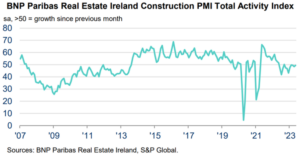Property Bridges is on a mission to bring high quality, peer-to-peer property lending to Ireland and offer a serious alternative to bank loans. Managing Director David Jelly spoke to Public Sector Magazine.
In recent years a swathe of industries and professions have been transformed beyond recognition by the disruptive influence of technology. The extent of the upheaval wrought by technological innovation is particularly evident in sectors such as retail, communications, transport and tourism but few sectors have escaped its pervasive impact.
The banking and financial sectors, traditionally slow to depart from age old practices continues to wrestle with the potential implications of alternative funding models facilitated by the advent of new technology. For the first time in generations the sector is facing concerted competition from tech-savvy and agile new market entrant’s intent on circumventing outmoded lending practices and capturing a slice of the lucrative market.
One example close to home, is Property Bridges, a company established last year by Armagh native, David Jelly, which offers a radical new lending solution to small and medium sized builders and developers operating in Ireland. The reluctance of Irish banks to provide funding to the new builders and developers that emerged following the decimation of the construction industry during the financial crisis has been routinely cited as a contributory factor in the failure to regenerate the industry and adequately address the ongoing housing supply deficit.
Jelly who had returned to Ireland following a 5-year stint working with UBS in Australia and US investment bank Jefferies in London sensed an opportunity in the seemingly intractable stagnation in the lending market and generally dysfunctional property sector. He had been struck by the story of the BD Bacata, the tallest Colombia skyscraper in Columbia which was built in 2012 and financed by thousands of ordinary citizen and felt certain the principals could be modified to provide a potential solution to the Irish problem.
Last April he left his job at fintech start-up, Eagle Alpha, where he had spent almost five years and focussed on establishing Property Bridges which operates from the NDRC in Dublin. An online peer-to-peer crowdfunding platform which connects investors to experienced property developers, Property Bridges aims to unlock the property market for investors and provide new funding avenues for small property developers.
“We are essentially a marketplace for property finance,” says Jelly. “After the financial crash a lot of banks involved in property lending exited the market entirely and for almost a decade, small to medium sized builders and developers have found it virtually impossible to secure any source of finance at all.
“The market landscape is completely different to what it was ten years ago and alternative lenders, most of which have connections to private equity and UK investment funds, are starting to dominate the marketplace. Property Bridges is completely different, we’re a peer-to-peer model and our platform the system by removing the need for intermediaries and middlemen and opening up attractive property investment opportunities for ordinary citizens as well as retail and institutional investors.
“While I was working in London, I could see that disruption was already impacting the equity markets as well as small business lending and property and individual loans. I researched the peer-to-peer models in the UK and looked at the success of Linked Finance which provides peer-to-peer loans to businesses. I thought it represented an ideal solution in the context of the difficulties affecting the Irish market. Property Bridges is a very similar model to the very successful companies you see operating in the UK and US and gives ordinary investors access to the property market while at the same time providing finance to small and medium-sized construction firms which have been starved of funding.
“Previously the only people who would have had access to these loans were very high net worth individuals and institutions like the banks. We secure our projects by taking first legal charge over the development site which provides an added level of security to the investment and we typically offer returns of between 7% and 9% to investors, which is very attractive.”
Property Bridges is a rare win-win venture. From as little as €500 investors can invest in projects previously far out of reach and have all the risk assessment, due diligence, appraisals, legal work and administrative requirements carried out by an experienced team of property and financial experts. Meanwhile, builders and developers eager to embark on new projects have recourse to a valuable source of non-bank lending. As opposed to typical institutional and pension related investments, investors signed up to Property Bridges also have a direct link to their investment. They can choose the profile of their investment and whether to commit their funds in residential developments or community related projects or in time to commercial ventures such as shopping centres or nursing developments or else invest. Investors to date have ranged from teenagers to those well beyond retirement age and the highest single investment has been €85,000. The loans are typically short term in nature ranging from three months to three years.
While the emergence of alternative lenders was initially viewed with trepidation by banks and established lenders, David says there is now a growing appreciation of the mutual benefits which can arise though synergies and collaborations with new market entrants.
“When they first began to emerge, a lot of banks would have viewed them as competitors and would have seen it as a zero-sum game,” he says. “However, you now see a lot of peer-to-peer lenders collaborating with the banks. In the UK, LendInvest are the market leaders in peer-to-per lending in the construction sector. They started out in 2013 as a peer-to-peer lender and when they established a track-record, institutional investors started investing through their platform and they began partnering with a number of banks.
“Banks are increasingly collaborating with these types of platforms and it is becoming more and more mainstream. They no longer see it as a zero-sum game but as something from which both parties can benefit. Peer-to-peer crowdfunding vehicles provide a very easy to use straightforward online platform for banks that are focused and looking at one specific area of the market while at the same time banks can provide credibility and market reach to these lenders.
“I think both the alternative lenders and the bank have a role to play. A very large development with a few hundred homes is probably better suited to a bank while we are often a better fit for small-medium sized developments in the €1m to €3m range. We can better serve small to medium sized developers who need speed and flexibility while banks need a certain size and scale to put in the resources to manage the loan.
The first project seeking investment on the site a one-year project for a house in Sandycove in Dublin was launched last October and the €250,000 sought by the borrower was raised in just two weeks. Prior to going live with the Sandycove loan, Jelly met with Marc Rafferty, a cofounder of Link Finance who became the first angel investor in the company and provided invaluable advice and guidance in promoting and managing their first live venture. A formal launch in the Conrad Hotel in the week prior to the launch attracted considerable interest and a targeted PR campaign which included a promotional video and site visit was also instrumental in the success of the Sandycove scheme.
“We worked tirelessly and did all we could to promote that loan,” recalls Jelly. “It took us just two weeks to raise €250,000 and we were delighted and relieved. It proved that our instincts had been correct. We are property mad as a nation which shows in the incredible diversity among our lenders which range in age from nineteen to people well into their 70s. We also have a considerable number of expats living abroad and earning good money which they want to invest back in Ireland. Two of our biggest lenders were female.
“Overall, the level of interest has been staggering. Our second loan was for a scheme of six social houses in Kilkenny and the builder was seeking to raise €600,0000 . We raised the first tranche of €200,000 in just two days and later raised the final for €400K,000 in three days.”
While Property Bridges is currently focussed on the short-term finance market, Jelly says the company is likely to venture into other investment products in the longer terms. “That is something we plan to look at,” he says. “We would like to have a range of investment products for our investors but at the present time it is just bridging and development financing. We want to establish ourselves in the market, build a good track record and grow our community of investors and developers before we look at more mainstream products.
For two years prior to the Sandycove launch Jelly had been assembling a team with the expertise necessary to ensure expert diligence is carried out in relation to the risk assessment on all loans provided. This is key to the success of Property Bridges and an ability to identify suitable, low-risk projects with strong investment fundamentals will be critical to building its investment community and ensuring repeat custom.
In addition to appointing a head of credit and portfolio management and head of operations with almost 40 years combined experienced in real estate, Property Bridges also work with OCFPM, a real estate consultancy business, who carry out an extensive report on each project the company is associated with. All investors have access to each of the documents produced. It also works with legal partners are LK Shields.
Often times, the best ideas come from emulating ventures that have provided successful in other jurisdictions. Jelly has introduced an exciting new lending and investment vehicle capable of galvanising Ireland’s vast interest in property and working to the benefit of citizens, builders and developers. “2019 is all about growth and establishing ourselves in the market and building on our processes, underwriting and due diligence. The overall goal is to become the go to place for property financing in Ireland in 3 to 5 years and build up a vibrant community of lenders and borrowers,” he says.
For further information and to invest visit www.propertybridges.com

